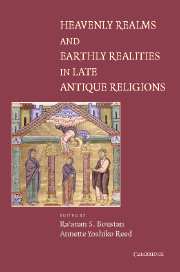Book contents
- Frontmatter
- Contents
- Preface
- List of Contributors
- Introduction: “In Heaven as It Is on Earth”
- PART ONE BETWEEN EARTH AND HEAVEN
- PART TWO INSTITUTIONALIZING HEAVEN
- PART THREE TRADITION AND INNOVATION
- 11 Angels in the Architecture: Temple Art and the Poetics of Praise in the Songs of the Sabbath Sacrifice
- 12 The Collapse of Celestial and Chthonic Realms in a Late Antique “Apollonian Invocation” (PGM I 262–347)
- 13 In Heaven as It Is in Hell: The Cosmology of Seder Rabbah di-Bereshit
- 14 The Faces of the Moon: Cosmology, Genesis, and the Mithras Liturgy
- 15 “O Paradoxical Fusion!”: Gregory of Nazianzus on Baptism and Cosmology (Orations 38–40)
- Select Bibliography
- Index
12 - The Collapse of Celestial and Chthonic Realms in a Late Antique “Apollonian Invocation” (PGM I 262–347)
Published online by Cambridge University Press: 14 July 2009
- Frontmatter
- Contents
- Preface
- List of Contributors
- Introduction: “In Heaven as It Is on Earth”
- PART ONE BETWEEN EARTH AND HEAVEN
- PART TWO INSTITUTIONALIZING HEAVEN
- PART THREE TRADITION AND INNOVATION
- 11 Angels in the Architecture: Temple Art and the Poetics of Praise in the Songs of the Sabbath Sacrifice
- 12 The Collapse of Celestial and Chthonic Realms in a Late Antique “Apollonian Invocation” (PGM I 262–347)
- 13 In Heaven as It Is in Hell: The Cosmology of Seder Rabbah di-Bereshit
- 14 The Faces of the Moon: Cosmology, Genesis, and the Mithras Liturgy
- 15 “O Paradoxical Fusion!”: Gregory of Nazianzus on Baptism and Cosmology (Orations 38–40)
- Select Bibliography
- Index
Summary
One of the many remarkable changes in pagan religious outlook in the late Roman period is the growing tendency to focus on the heavens as the abode of a frequently transcendent god and to develop techniques of ascension to gain access to this (usually male) divinity or his divine knowledge. The presence of a powerful male god in the celestial, realm is not new, of course; the Greeks in archaic and classical times tend to divide up the supernatural into two fairly distinct categories, each with their own forms of ritual and address: (1) the Olympian or celestial, and (2) the chthonian. In the earlier periods, a person could search for supernatural knowledge or prophecy in either direction, upward: for example, by consulting an oracle of Apollo or Zeus, or downward by performing a necromantic ritual or (in mythic narratives) by making a journey to interrogate a ghost. In later antiquity, however, as pagan worshippers turned their eyes increasingly to heavenly deities for divine knowledge, necromancy and other forms of chthonian prophecy seem to diminish in importance. This is not to say that the chthonian forces were abandoned: Indeed, the hundreds of defixiones from around the Mediterranean attest the continued popularity and power of Persephone, Hermes, Hecate, and various underworld demons and ghosts during the late imperial periods. But, divination rites do seem to change with the times and increasingly to orient themselves in a celestial direction, suggesting that heaven alone was the source for divine wisdom and prophecy.
- Type
- Chapter
- Information
- Heavenly Realms and Earthly Realities in Late Antique Religions , pp. 213 - 232Publisher: Cambridge University PressPrint publication year: 2004
- 1
- Cited by



